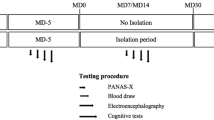Abstract
Time-zone travelers encounter a pattern of light and darkness, and their endogenous circadian rhythms adapt to the new external time cue until both timing systems synchronize1, but the long-term repeated disturbance of synchronization between the two timing systems impairs physiological and psychological health and induces stress2. Salivary cortisol levels in cabin crew after repeated exposure to jet lag were significantly higher than after short distance flights3, and the higher cortisol levels were associated with cognitive deficits that were dependent on non-semantic stimuli3. The present study demonstrates that significant prolonged cortisol elevations produce reduced temporal lobe volume and deficits in spatial learning and memory; these cognitive deficits became apparent after five years of exposure to high cortisol levels.


Similar content being viewed by others
References
Deacon, S. & Arendt, J. Physiol. Behav. 59, 665–673 (1996).
Winget, C. M., DeRosha, C. W., Markley C. L. & Holley, D. C. Aviat. Space Environ. Med. 55, 1085–1096 (1984).
Cho, K., Ennaceur, A., Cole, J. C. & Suh, C. H. J. Neurosci. 20 (RC66), 1–5 (2000).
Porter, N. M. & Landfield, P. W. Nat. Neurosci. 1, 3–4 (1998).
Lupien, S. L. et al. Nat. Neurosci. 1, 69–73 (1998).
Newcomer, J. W. et al. Arch. Gen. Psych. 56, 527–533 (1999).
Abrahams, S. et al. Brain Cogn. 41, 39–65 (1999).
Sapolsky, R. Stress, the Aging Brain, and the Mechanisms of Neuron Death (MIT Press, Cambridge, Massachusetts, 1992).
Nunn, J. A., Graydon, F. J. X., Polkey, C. E. & Morris, R. G. Brain 122, 47–59 (1999).
Squire, L. R., Amaral, D. G. & Press, G. A. J. Neurosci. 10, 3106–3117 (1990).
Brown, M. W. & Aggleton, J. P. Nat. Rev. Neurosci. 2, 51–61 (2001).
Lupien, S. L. et al. J. Clin. Endocrinol. Metab. 82, 2070–2075 (1997).
Acknowledgements
Supported by the Royal Society. I thank M.W. Brown, C.H. Suh, M.K. Lim and S. Fitzjohn for their help with statistics and MRI analysis.
Author information
Authors and Affiliations
Corresponding author
Rights and permissions
About this article
Cite this article
Cho, K. Chronic 'jet lag' produces temporal lobe atrophy and spatial cognitive deficits. Nat Neurosci 4, 567–568 (2001). https://doi.org/10.1038/88384
Received:
Accepted:
Issue Date:
DOI: https://doi.org/10.1038/88384
- Springer Nature America, Inc.
This article is cited by
-
The clock gene Per1 may exert diurnal control over hippocampal memory consolidation
Neuropsychopharmacology (2023)
-
Multimodal investigation of the association between shift work and the brain in a population-based sample of older adults
Scientific Reports (2022)
-
Chronobiology of transient global amnesia
Journal of Neurology (2022)
-
Inhibition of casein kinase 1 δ/ε improves cognitive performance in adult C57BL/6J mice
Scientific Reports (2021)
-
Circadian rhythms: influence on physiology, pharmacology, and therapeutic interventions
Journal of Pharmacokinetics and Pharmacodynamics (2021)




